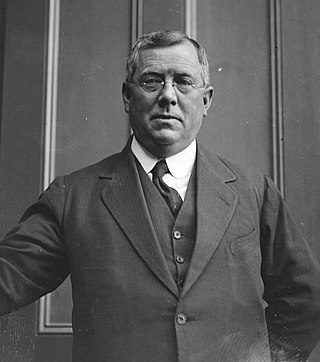History
| | This section is empty. You can help by adding to it. (July 2022) |
The 33rd New Brunswick Legislative Assembly represented New Brunswick between February 13, 1913, and January 20, 1917.
Josiah Wood served as Lieutenant-Governor of New Brunswick.
G.J. Clarke was chosen as speaker in 1913. W.B. Dickson became speaker in 1914 after Clarke became party leader in 1914. O.M. Melanson became speaker in 1916 after Dickson died.
The Conservative Party led by James Kidd Flemming formed the government. George Johnson Clarke became party leader in 1914 when Flemming was forced to resign. When Clarke resigned due to poor health in 1917, James Alexander Murray served as leader until the general election held later that year.
| | This section is empty. You can help by adding to it. (July 2022) |

Francis Gwynne Tudor was an Australian politician who served as the leader of the Australian Labor Party from 1916 until his death. He had previously been a government minister under Andrew Fisher and Billy Hughes.
The New Brunswick Liberal Association, more popularly known as the New Brunswick Liberal Party or Liberal Party of New Brunswick, is one of the two major provincial political parties in New Brunswick, Canada. The party descended from both the Confederation Party and the Anti-Confederation Party whose members split into left-wing and right-wing groups following the creation of Canada as a nation in 1867.

The Progressive Conservative Party of New Brunswick is a centre-right, conservative political party in the Canadian province of New Brunswick. The party has its origins in the pre-Canadian confederation Conservative Party that opposed the granting of responsible government to the colony. It has historically followed the Red Tory tradition. The Progressive Conservative Party currently leads the provincial government since 2018 under Premier Blaine Higgs.
Hugh John Flemming was a politician and the 24th premier of New Brunswick from 1952 to 1960.

Walter Edward Foster was a Canadian politician and businessman in New Brunswick.
George Johnson Clarke was a New Brunswick lawyer, journalist and politician.
James Kidd Flemming was a businessman and politician in New Brunswick, Canada.

James Thomas Dooley served twice, briefly, as Premier of New South Wales during the early 1920s.

Frank Broadstreet Carvell, was a Canadian lawyer, businessman, and politician.

The 53rd New Brunswick Legislative Assembly was created following a general election in 1995 and was dissolved on May 8, 1999.

The 3rd Alberta Legislative Assembly was in session from September 16, 1913, to April 5, 1917, with the membership of the assembly determined by the results of the 1913 Alberta general election held on April 17, 1913. The Legislature officially resumed on September 16, 1913, and continued until the fifth session was prorogued on April 17, 1917 and dissolved on May 14, 1917, prior to the 1917 Alberta general election.

James Gardiner was an Australian politician who served in the Legislative Assembly of Western Australia from 1901 to 1904 and from 1914 to 1921. He served as colonial treasurer under two premiers, Walter James and Henry Lefroy. Gardiner was also the inaugural state leader of the Country Party from 1914 to 1915, and briefly served as Speaker of the Legislative Assembly from March to June 1917.
The 32nd New Brunswick Legislative Assembly represented New Brunswick between April 30, 1908, and May 25, 1912.

Charles Carty Salmon was an Australian politician who served as the second Speaker of the Australian House of Representatives, in office from 1909 to 1910. A doctor by profession, he began his political career in the Victorian Legislative Assembly before winning election to the House of Representatives at the inaugural 1901 federal election. He represented the Protectionist Party initially and then the Liberal Party, serving as Speaker for the duration of the Third Deakin Ministry. Salmon lost his seat in 1913, but returned to the House at a by-election in 1915. He died in office two years later.

An election to the County Council of London took place on 5 March 1913. It was the ninth triennial election of the whole Council. The size of the council was 118 councillors and 19 aldermen. The councillors were elected for electoral divisions corresponding to the parliamentary constituencies that had been created by the Representation of the People Act 1884. There were 57 dual member constituencies and one four member constituency. The council was elected by First Past the Post with each elector having two votes in the dual member seats. Unlike for parliamentary elections, women qualified as electors for these elections on exactly the same basis as men. Women were also permitted to stand as candidates for election.
Members of the New South Wales Legislative Assembly who served in the 23rd parliament of New South Wales held their seats from 1913 to 1917. They were elected at the 1913 state election on 6 December 1913. The Speaker was Richard Meagher.

The Holman ministry , first Holman ministry or Holman Labor ministry was the 35th ministry of the New South Wales Government, and was led by the 19th Premier, William Holman.
The 3rd Legislative Assembly of Saskatchewan was elected in the Saskatchewan general election held in July 1912. The assembly sat from November 14, 1912, to June 2, 1917. The Liberal Party led by Walter Scott formed the government. Scott resigned as premier on October 16, 1916, and was succeeded by William Melville Martin. The Conservative Party of Saskatchewan led by Wellington Willoughby formed the official opposition.

The members of the 23rd General Assembly of Newfoundland were elected in the Newfoundland general election held in October 1913. The general assembly sat from 1914 to 1919.
Michael Francis "Frank" Troy was an Australian politician who served in the Legislative Assembly of Western Australia from 1904 to 1939. A member of the Labor Party, he was the Speaker of the Legislative Assembly from 1911 to 1917, the first from that party to hold the position. Later in his career, Troy spent long periods as a frontbencher, serving as a minister in the first and second Collier governments, and then in the Willcock government. After leaving parliament, he served as Agent-General for Western Australia from 1939 to 1947.